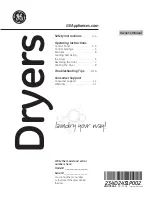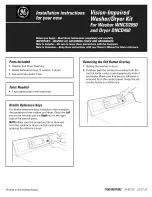
EN
CoMBuSTIon ChaMBER GaS hEaTED InSTRuCTIonS-REGulaTIonS
DiBO 36
13
17. Security advices
Service and repairs must be carried out by well trained personnel only.
In the low pressure range ½“ heating coils must absolutely be used.
Make sure that the flow pressure of the water amounts to 4 bar at least.
Otherwise steam bubbles might build up inside the heating coil, which leads to an intermittent flow. In case the flow control
device fails, this leads to a burn out of the combustion chamber with possible damages by fire and/or injuries of the
personnel.
The safety valves always have to be adjusted precisely to the operating pressure (S. 5, P. 9.4).
Pressure peaks caused by switching impulses or choked nozzles cannot be relieved by an improperly adjusted valve.
This may cause the heating coil or the fittings to burst. In the worst case this may lead to serious injuries to the operator
or adjacent personnel.
Make sure that the exhaust gas and the additional air venting is appropriate (S. 6, P. 9.6+9.7).
Exhaust gas conduits which are not properly fitted or not sufficiently dimensioned as well as insufficient additional
air conduits may cause fire damage to buildings and in the worst case cause injuries to persons.
18. Trouble shooting guide (false start or failure):
18.1 The burner does not work
Check the safety fuse.
Check the connecting conduit.
Check the motor.
Is there enough water?
Is the gas supply sufficient?
Is the temperature limiting safety device unlocked?
Is the adjustment of the (digital)thermostat correct?
18.2 The pump does not produce any pressure.
(valid for high pressure cleaners only)
The chemical tank is empty while the chemical valve is open.
Close the valve or refill the chemical substances.
The installed nozzle is too big or worn out.
Install a new nozzle.
The pump collar is defective – replace it.
The valves of the pump are dirty or not tight – clean or replace them.
Dirt inside the pressure regulating valve – clean it.
Wrong adjustment of the pressure regulating valve – renew the adjustment.
The water quantity in the water tank is too low – see to a sufficient water supply.
18.3 The water quantity is too low in spite of full pressure:
The heating coil has become furred – decalcify it.
The jet nozzle is choked– clean it.
18.4 The chemicals are not sucked in:
The chemical tank is empty – refill the chemicals.
The chemical valve is not open– open it.
The chemical conduit is choked or defective– replace it.
The injector is dirty – clean it.
18.5 The high pressure pump clocks while the pistol is closed:
(valid for high pressure cleaners only)
The pistol is not tight – renew the pistol or the seat of the valves.
Leakiness in the conduit under pressure – seal it.
Summary of Contents for SBH-G-D
Page 2: ......
Page 4: ......
Page 54: ...NL Brander BR1000G instructies en voorschriften DiBO 54 31...
Page 55: ...Brander BR1000G instructies en voorschriften NL DiBO 55 32...
Page 56: ...NL Brander BR1000G instructies en voorschriften DiBO 56 33...
Page 57: ...Brander BR1000G instructies en voorschriften NL DiBO 57 34...
Page 66: ......
Page 68: ......
Page 98: ......
Page 100: ......
Page 150: ...EN Combustion chamber gas heated instructions regulations DiBO 54 31...
Page 151: ...Combustion chamber gas heated instructions regulations EN DiBO 55 32...
Page 152: ...EN Combustion chamber gas heated instructions regulations DiBO 56 33...
Page 153: ...Combustion chamber gas heated instructions regulations EN DiBO 57 34...
Page 162: ......
Page 164: ......
Page 206: ...DE Brennerkammer BR1000G Anweisungen Vorschriften DiBO 46 23 30 Schaltplan BR1000G...
Page 214: ...DE Brennerkammer BR1000G Anweisungen Vorschriften DiBO 54 31...
Page 215: ...Brennerkammer BR1000G Anweisungen Vorschriften DE DiBO 55 32...
Page 216: ...DE Brennerkammer BR1000G Anweisungen Vorschriften DiBO 56 33...
Page 217: ...Brennerkammer BR1000G Anweisungen Vorschriften DE DiBO 57 34...
















































